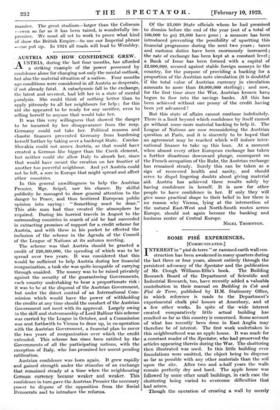AUSTRIA AND HOW CONFIDENCE GREW. A USTRIA, during the last four
months, has afforded a striking example of the power possessed by confidence alone for changing not only the mental outlook, but also the material situation of a nation. Four months ago conditions were considered in all Austria as desperate, if not already fatal. A cataclysmic fall in the exchange, the latest and severest, had left her in a state of mental paralysis. She could think of nothing better than to apply piteously to all her neighbours for help ; for this aid she appeared to be ready for any sacrifice, even to selling herself to anyone that would take her.
It was this very willingness that showed the danger to be incurred by her disappearance from the map. Germany could not take her. Political reasons and chaotic finances prevented Germany from burdening herself further by taking over a bankrupt State. Czecho- Slovakia could not annex Austria, as that would have created a German bloc bigger than the Czech element, but neither could she allow Italy to absorb her, since that would have meant the creation on her frontier of another too powerful neighbour. And yet Austria could not be left, a sore in Europe that might spread and affect other countries.
In this general unwillingness to help the Austrian Premier, Mgr. Seipel, saw his chance. By skilful -publicity -he managed to draw general attention to the danger to Peace, and thus bestirred European public opinion into saying : "Something must be done." This able man had thus created the atmosphere he -required. During his hurried travels in August to the surrounding countries in search of aid he had succeeded ' in extracting promises of support for a credit scheme for Austria, and with these in his pocket he effected the inclusion of the scheme in the Agenda of the Council of the League of Nations at its autumn meeting.
The scheme was that Austria should be granted a credit of £26,500,000, the spending of which was to be spread over two years. It was considered that this would be sufficient to help Austria during her financial reorganization, a task she was quite incapable of carrying through unaided. The money was to be raised privately against the security of the guaranteeing Governments, each country undertaking to bear a proportionate risk it was to be at the disposal of the Austrian Government, but under the direct control of' an International Com- mission which would have the power of withholding the credits at any time should the conduct of the Austrian Government not meet with its approval. Largely owing to the skill and statesmanship of Lord Balfour this scheme was carried by the League in October, and a Commission was sent forthwith to Vienna to draw up, in co-operation with the Austrian Government, a financial plan to cover the two years of reorganization over which the credit -extended. This scheme has since been ratified by the Governments of all the participating nations, with the exception of Italy, who has promised her assent pending ratification.
Austrian confidence was born again. It grew rapidly and gained strength under the stimulus of an exchange that remained steady at a time when the neighbouring German currency became weaker and weaker. This confidence in turn gave the Austrian Premier the necessary power to dispose of the opposition from the Social Democrats aril to introduce the reforms. Of the 25,000 State officials whom he had promised to dismiss before the end of the year (out of a total of 100,000 to go) 23,600 have gone ; a measure has been introduced preventing the possibility of upsetting this financial programme during the next two years ; taxes and customs duties have been enormously increased ; the-rate of exchange has been kept at a constant level.; a Bank of Issue has been formed with a capital of /2,000,000, secured against stable.foreign moneys in --the country, for the purpose of providing a backing for a proportion of the Austrian note circulation (it is doubtful if the total value of Austrian currency in circulation amounts to more than £6,000,000 sterling) ; and now, for the first time since the War, Austrian kronen have begun to flow into the savings banks. All this has been achieved without one penny of the credit having been yet advanced !
But this state of affairs cannot continue indefinitely. There is a limit beyond which confidence by itself cannot go without some more material backing to help it. The League of Nations are now reconsidering the Austrian question at Paris, and it is sincerely to be hoped that an agreement may be reached which will induce inter- national finance to take up this loan. At a moment when almost every other European exchange has taken a further disastrous downward plunge, consequent on the French occupation of the Ruhr, the Austrian exchange has remained steady. Surely this can be taken as a sign of recovered health and sanity, and should serve to dispel lingering doubts about giving material aid. Austria has achieved these results solely by having confidence in herself. It is now for other people to have confidence in her. If only they will give some practical shape to their belief in her there is no reason why Vienna, lying at the intersection of the natural East-West and North-South routes across Europe, should not again become the banking and business centre of Central Europe.
NIGEL THORNTON.


































































 Previous page
Previous page